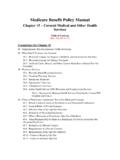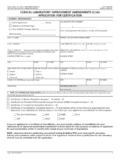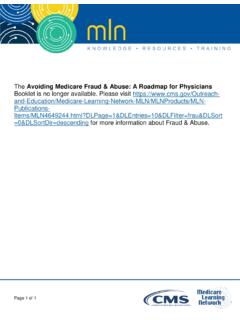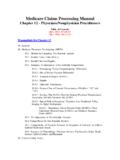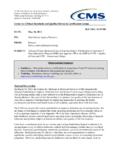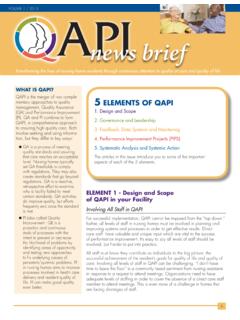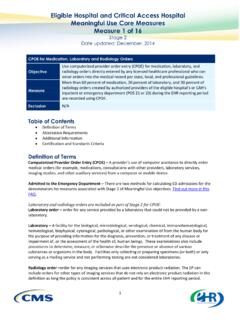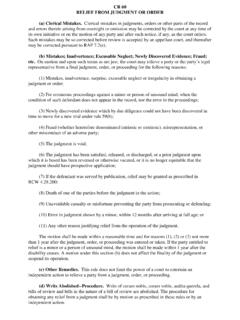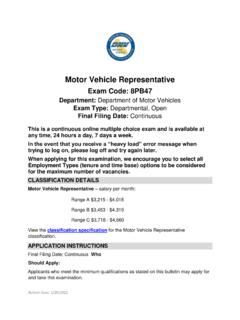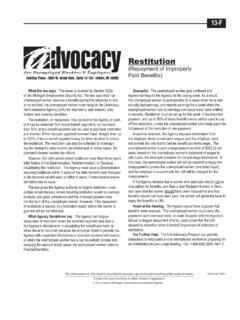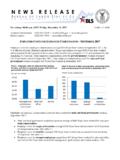Transcription of Medicare Claims Processing Manual
1 Medicare Claims Processing Manual Chapter 34 - Reopening and Revision of Claim Determinations and Decisions (Rev. 4219, 01-25-19) Table of Contents Transmittals for Chapter 34 10 - Reopenings and Revisions of Claim Determinations and Decisions - General - Authority to Conduct a Reopening - Refusal to Reopen is Not an Initial Determination - R eopening of Denials Based on an Unanswered ADR Request - Reopenings Based on clerical or Minor Errors and Omissions - Providers Submitting Adjustments - Telephone Reopenings Required for A/B MACs (B) Only - Informing the Provider Communities About the Telephone Reopenings Process - Issues for Telephone Reopenings - Conducting the Telephone Reopening - Documenting the Telephone Reopening Monitoring the Telephone Reopening - Timeframes to Reopen Claim Determinations - Timeframes for Contractor Initiated Reopenings - Timeframes for Party Requested Reopenings - Timeframes for Adjudicator to Reopen - Timeframes When a Party Requests an Adjudicator Reopen Their Decision - Timeframes to Complete a Reopening Request by a Party - Notice of a Revised Determination or Decision - Revised Determination or Decision - Effect of a Revised Determination or Decision - Good Cause for Reopening - What Constitutes New and Material Evidence Policies Related to Good Cause Reopenings for New and Material Evidence What Constitutes Error on the Face of the Evidence - Change in Substantive Law or Interpretative Policy System and Processing Requirements
2 For Use of Secure Internet Portal/Application to Support Reopening Activities 10 - Reopenings and Revisions of Claims Determinations and Decisions - General (Rev. 3568, Issued: 07-29-16, Effective: 09-30-16, Implementation: 09-30-16) A reopening is a remedial action taken to change a binding determination or decision that resulted in either an overpayment or an underpayment, even though the determination or decision was correct based on the evidence of record. Reopenings are separate and distinct from the appeals process. Reopenings are a discretionary action on the part of the contractor. A contractor s decision to reopen a claim determination is not an initial determination and is therefore not appealable. Requesting a reopening does not toll the timeframe to request an appeal. If the reopening action results in a revised determination, then new appeal rights would be offered on that revised determination. Under certain circumstances a party may request a reopening even if the timeframe to request an appeal has not expired.
3 Historically, contractors have employed a variety of informal procedures under the general heading of reopenings, re-reviews, informal redeterminations, etc. Providers, physicians and suppliers may have come to view these as appeal rights. However, as stated above, reopenings are separate and distinct from the appeals process. They are not a party s right. Contractors shall not use them to provide an appeal when a formal appeal is not available. Contractors should also note that while clerical errors must be processed as reopenings, all decisions on granting reopenings are at the discretion of the contractor. Contractors may conduct a reopening to revise an initial determination or redetermination. Medicare Secondary Payer (MSP) recovery Claims where the debtor is the beneficiary or provider/supplier are not reopening actions except where the recovery claim is a MSP provider/supplier recovery claim because the provider/supplier failed to file a proper claim as defined in 42 CFR Part 411.
4 Aside from this one exception, MSP recovery Claims involve recovery of the insurance funds at issue, not recovery of the payment previously made by Medicare . Consequently, the recovery action does not involve the reopening of Medicare 's payment determination. The MSP recovery demand letter is an "initial determination" as defined in 42 CFR , not a reopening and revision of Medicare 's initial Claims payment determination. - Authority to Conduct a Reopening (Rev. 3568, Issued: 07-29-16, Effective: 09-30-16, Implementation: 09-30-16) Reopenings can be conducted by a contractor to revise an initial determination, revised initial determination or redetermination; a Qualified Independent Contractor (QIC) to revise a reconsideration; an Administrative Law Judge (ALJ) to revise a hearing decision, and the Appeals Council (AC) to revise an ALJ decision or their own review decision. Reopenings are generally not conducted until a party s appeal rights have been exhausted or the timeframe to file a request for an appeal has expired.
5 There are two exceptions that allow a reopening to be conducted when appeal rights have not been exhausted or the timeframe to request an appeal has not expired. These exceptions are: Cases where Medical Review (MR) requested documentation, did not receive it, and issued a denial based on no documentation ( , Group Code: CO - Contractual Obligation; Claim Adjustment Reason Code (CARC) 50 - these are non-covered services because this is not deemed a medical necessity by the payer; and Remittance Advice Remark Code (RARC) M127 - Missing patient medical record for this service). Subsequently, if the party requests an appeal and submits the requested documentation with that appeal, it shall be treated as a reopening; and clerical errors (which includes minor errors and omissions) shall be treated as reopenings. If a contractor receives a valid and timely request for redetermination and begins Processing the request as a reopening ( clerical error or otherwise) and later determines that a reopening cannot be performed, or the determination cannot be changed, the contractor shall not issue a refusal to reopen notice.
6 Rather, the contractor shall process the request as a valid/timely redetermination (as originally requested by the party) in accordance with Pub. 100-04, chapter 29. If a party has filed a valid request for an appeal, the adjudicator at the lower levels of the appeals process loses jurisdiction to reopen the claim on the issues in question. For example, a party simultaneously requests a QIC reconsideration and a reopening with the contractor. The contractor can no longer reopen that redetermination decision now that the party has filed a valid request for QIC reconsideration. This does not preclude contractors from accepting and Processing remands from the QIC. As stated previously, it is within the contractor s discretion to accept reopening requests, but once accepted, they must be processed in accordance with the above instruction. - Refusal to Reopen Is Not an Initial Determination (Rev. 1069, Issued: 09-29-06, Effective: 11-29-06, Implementation: 11-29-06) A finding that a prior determination or decision will not be reopened is not an initial determination or decision.
7 A contractor s choice not to reopen is not appealable. Accordingly, the contractor shall not include a statement concerning the right to an appeal in the notice informing the party that their reopening request cannot be processed. A party may however request an appeal on the original claim denial, but must do so within the required timeframes. If a contractor receives a reopening request and does not believe they can change the determination, they should not process the request. - Reopenings of Denials Based on an Unanswered Additional Documentation Request (ADR) (Rev. 1069, Issued: 09-29-06, Effective: 11-29-06, Implementation: 11-29-06) If a claim is suspended for medical review, an ADR may be issued to obtain information needed to make a determination. Providers, physicians, and suppliers are responsible for providing the information needed to adjudicate their Claims . If no response is received to the ADR within the specified timeframes, the medical review department will likely deny the service as not reasonable and necessary based on a lack of documentation.
8 If such a denial is appealed, the Medical Review department at the contractor shall perform a reopening instead of an appeal if all of the following conditions are met: 1) A provider failed to timely submit documentation requested through an ADR; 2) The claim was denied because the requested documentation was not received timely; 3) The requested documentation is received after the 45 day period with or without a request for redetermination or reopening; AND, 4) The request is filed within 120 days of the date of receipt of the initial determination. If all 4 criteria are not present, the request is for a redetermination and it is submitted within 120 days of the date of receipt of the initial determination, handle it as an appeal and do not ship the case back to MR. In this instance, the request must meet the criteria for a valid request for redetermination (see Pub. 100-04, Chapter 29, ) in order for the appeals unit to accept the request. The CMS is handling these requests outside of the appeals process because CMS wants to encourage providers, physicians and suppliers to submit documentation when requested in order to prevent unnecessary appeals.
9 Contractors should note that this requirement does not extend the time frame for filing an appeal. Therefore, only those appeal requests that are submitted within 120 days of the date of receipt of the initial determination and meet all of the criteria above should be shipped back to MR for a reopening. When the appeals unit ships cases back to the MR unit, MR must reopen those cases. If the request is submitted after 120 days, contractors may grant a regular reopening at their discretion or dismiss the request if no good cause explanation is provided for the late filing. If the ADR reopening results in an affirmation of the original denial or an adverse decision, the provider will retain their right to a redetermination. The date of the MR decision will be the date used to calculate the 120 days to request a redetermination. - Reopenings Based on clerical or Minor Errors and Omissions (Rev. 3568, Issued: 07-29-16, Effective: 09-30-16, Implementation: 09-30-16) Section 937 of the Medicare Modernization Act (MMA) required CMS to establish a process, separate from appeals, whereby providers, physicians and suppliers could correct minor errors or omissions.
10 We equate the MMA s minor error or omission to fall under our definition of clerical error, located in 42 CFR (a)(3). We believe that it is neither cost efficient nor necessary for contractors to correct clerical errors through the appeal process. Thus, 42 CFR and (a)(3) require that clerical errors be processed as reopenings rather than appeals. CMS defines clerical errors (including minor errors or omissions) as human or mechanical errors on the part of the party or the contractor, such as: Mathematical or computational mistakes; Transposed procedure or diagnostic codes; Inaccurate data entry; Misapplication of a fee schedule; Computer errors; or, Denial of Claims as duplicates which the party believes were incorrectly identified as a duplicate. Incorrect data items, such as provider number, use of a modifier or date of service. Note that clerical errors or minor errors are limited to errors in form and content, and that omissions do not include failure to bill for certain items or services.
